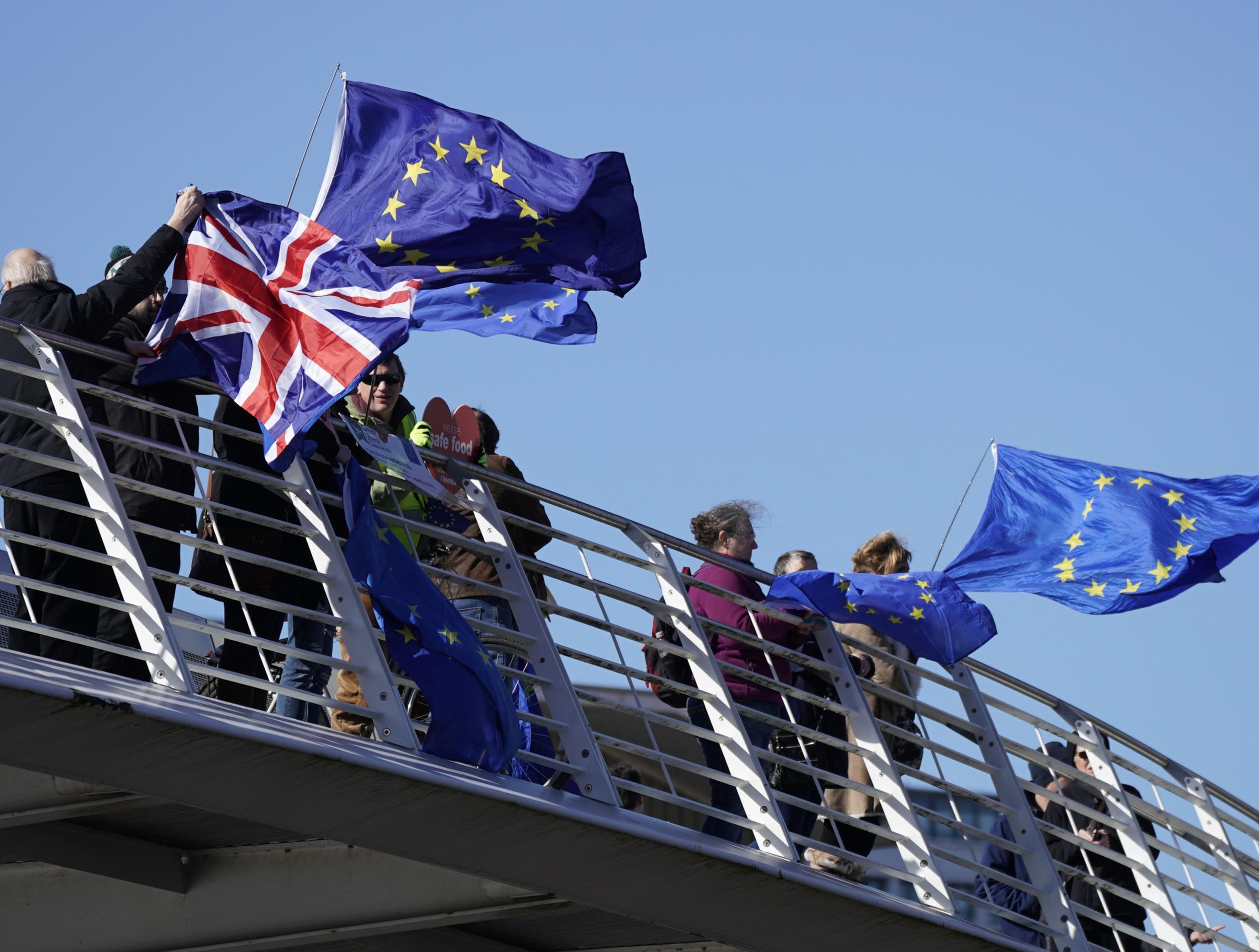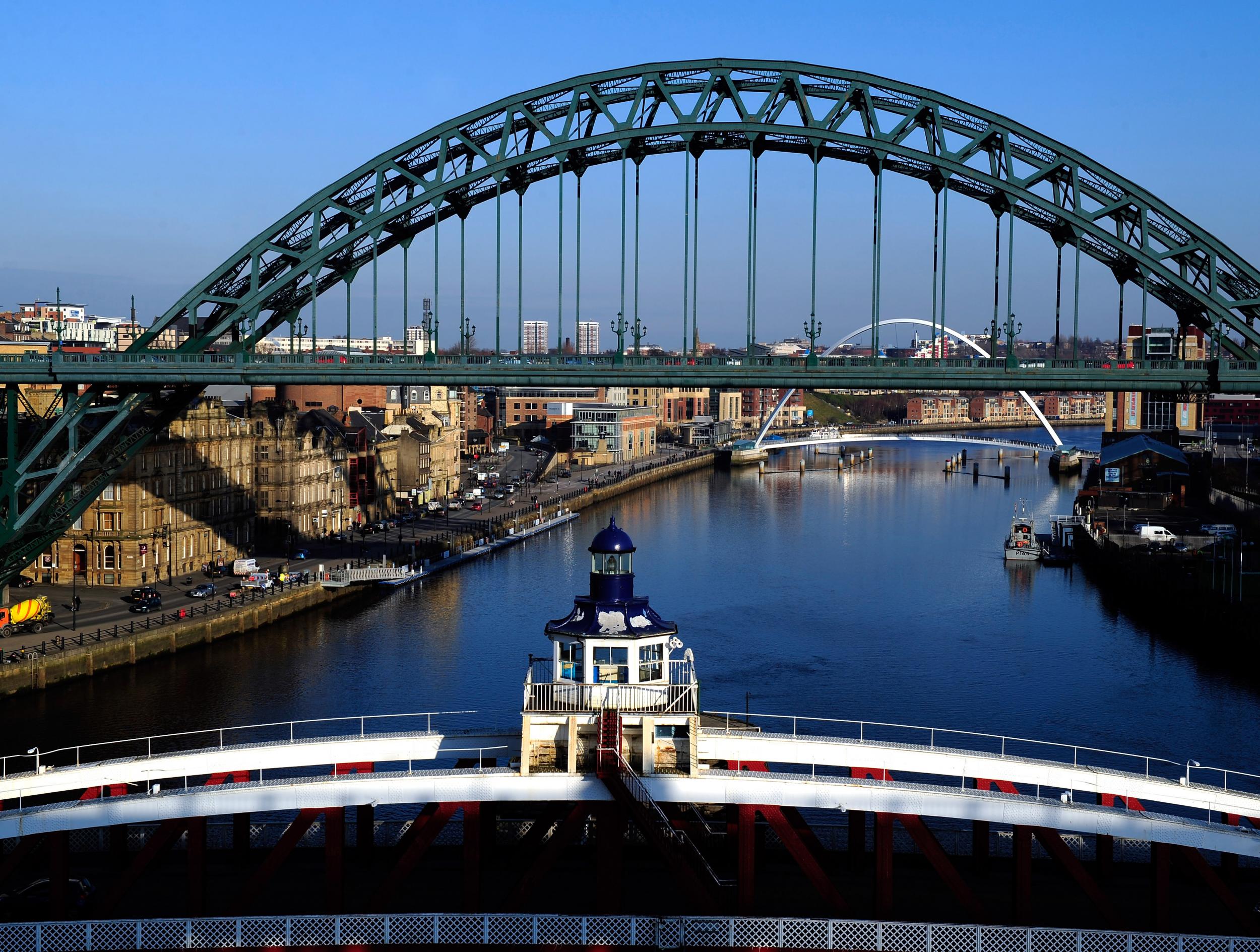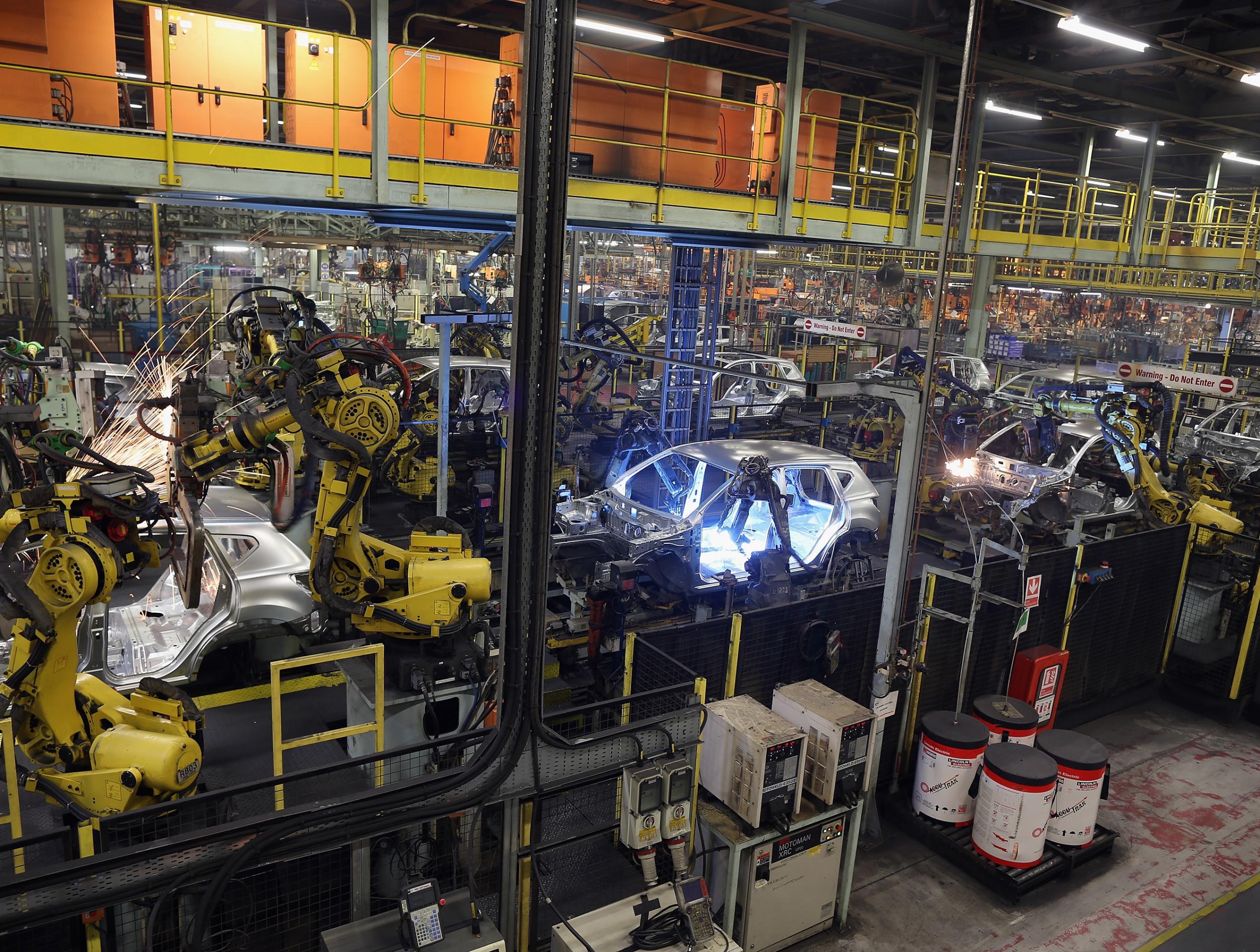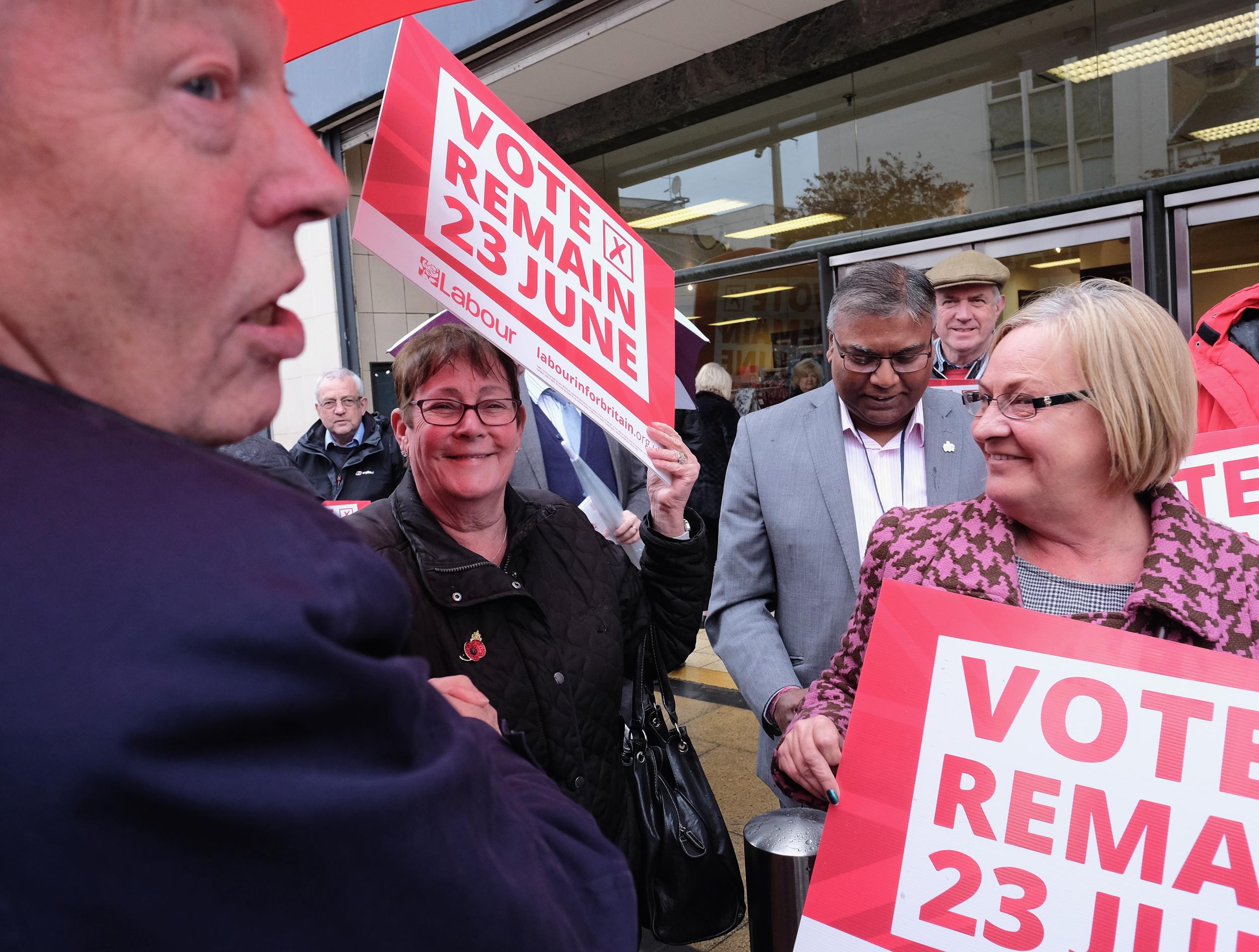True north: Three years on, what do Newcastle and Sunderland really think of Brexit?
They have been scorned as turkeys voting for Christmas, but Patrick Cockburn finds many in the northeast think this oversimplifies their reasons for wanting to exit the EU


Many in northeast England express anger at what they see as patronising and insulting explanations for their vote to leave the EU. They say that they are being portrayed as hillbillies from the deindustrialised wastelands of the north who stupidly acted against their own best interests. They particularly object to the cliche describing their strong support for Brexit as “turkeys voting for Christmas”.
“I call it ‘prole porn’,” says one Leave supporter from Newcastle who did not want his name published, condemning what he considers to be a crude caricature of the reasons why a majority in the northeast – and particularly those from “proletarian” areas – want Britain out of the European Union. He says that the reasoning behind the region’s 58 to 42 per cent vote for Leave in the 2016 referendum was nuanced, rational and not simply an ill-considered thumbs-down to the status quo. “It was far more complex than a simple wish to give the government a kick in the teeth,” he says, “and voters really did understand why they were voting for Brexit.”
Others in the northeast vigorously contest this. Tony Curtis, a vicar in Shiremoor, North Tyneside, has a parish centred on deprived housing estates, but with a flourishing business park employing 8,000 people at one end of it. Asked to explain why people voted for Brexit, he says: “They largely did so because of scapegoating – blame everything on Brussels, blame everything on immigration. In the past this has been a useful excuse for governments that failed to replace traditional shipbuilding and heavy industry, particularly along the coast from Sunderland to Teesside where you see the strongest support for Leave. When the referendum happened, all those chickens came home to roost.”
The referendum decision may have been a protest vote, but then the 2.6 million people living in the region have a lot to protest about
Curtis, formerly an executive in the railways whom friends say took a £150,000 salary cut to retrain as a clergyman, says that it is a mistake to see everybody in the northeast as desperate to leave the EU. As in the rest of the UK, the poll showed strong support for both sides: Newcastle narrowly voted Remain, while in the northern part of the region – also including North Tyneside, Northumberland, Gateshead, Darlington and Durham – the Remain vote was well over 40 per cent. It is further south, in places like Middlesbrough, Redcar and Hartlepool, that Leave support is stronger and only a third or less of voters wanted to stay in the EU.
The referendum decision may have been a protest vote, but then the 2.6 million people in the region have a lot to protest about. Andy Pike, professor of regional development studies at Newcastle University, says that “post-2008, you have a collapse in real wages which is most acutely felt in deindustrialised and coastal areas. A lot of people there were voting Leave as a cry of rage.” Where new jobs are created, they tend to be low-quality and poorly paid. The northeast has the highest proportion of minimum- or living-wage jobs in the country. With so many people on low incomes, the region is disproportionately hit by cuts to the benefit system and welfare reform. Some 25 per cent of jobs are in the public sector so any reduction in government spending will likewise affect the region particularly badly.

Pike makes the point that the northeast is vulnerable to any dislocation in trade following Brexit because “it exports more goods per capita to the EU than any other region”. Cars and pharmaceuticals would be seriously affected. The crisis over leaving the EU and central government in London thinking about nothing but Brexit is having a chilling effect on investment. If Nissan – with its 5,000 employees in its car plant in Sunderland and a further 36,000 among its suppliers – is closed, “it would be a meltdown scenario, a real hammer blow, and I don’t think we could come back from that”.
International companies with branches in the region will be frightened off, according to Pike. Because of the overall weakness of the northeast’s economy, it would be less able than other parts of the UK to absorb the kind of punch that could be just round the corner if there were a radical break with Europe. If there are economic opportunities post-Brexit in the shape of new markets abroad or import substitution at home, as Eurosceptics claim, then Pike doubts if the northeast has the resources or the adaptability to take advantage of them. He says that the northeast has done well out of well-administered EU funding for the region, which an over-centralised British government may not be able to replicate.
A German guy who used to run our cancer research woke up after the vote and decided that the place he was living in did not want him anymore and he went off to the Netherlands
Supporters of Remain say that they find it inexplicable that people in the northeast should want to leave the EU when they are likely to be the first and most serious casualty of the UK’s departure. The EU is Britain’s largest single market, three times bigger than the US, and EU funding has been targeted at deprived regions like the northeast, the Welsh valleys and rural counties such as Cornwall and Lincolnshire.
It is not only the metropolitan elite who say this, but residents of many places where the majority of their neighbours voted for Brexit. Anne Brennan, a schoolteacher in South Shields who lives in Sunderland, recalls how the EU funded improvements to the seafront and there are EU symbols everywhere but says this had little effect on local opinion. Curtis says: “I remember when the Quayside [on the Tyne in Newcastle] was regenerated and the city centre began to come alive because of EU funding.”
Perceptions of EU largesse differ greatly: among the biggest beneficiaries are the universities, and Newcastle University defiantly flew the EU flag on 29 March, the day that the UK had been supposed to leave the EU. With 28,000 students and 5,500 staff, the university is firmly plugged into the same globalised world that others in the northeast may see as destabilising or destroying their way of life. All over Europe, expanded universities have been a much-favoured means of regenerating cities that are no longer centres of commerce and industry. It is a formula that works well: Newcastle draws 80 per cent of its annual intake of 5,500 students from outside the northeast, but half of them stay on to work in the region after graduation. Newcastle city centre has been revived, but universities – Northumbria University in Newcastle has another 27,000 students – do not come near to replacing the engineering and chemical works, shipyards and mines, that once put the northeast of England at the heart of the industrial revolution.

Chris Day, the vice chancellor of Newcastle University, confesses that he was surprised when the UK voted three years ago to leave the EU: “It is the company you keep – university and London people didn’t understand what Sunderland and Wales were thinking.” For him and his university, the pluses of EU membership and the minuses of Brexit are obvious, especially in the funding of research. The UK government gives £900m to the EU for research and UK universities get £1.6bn back because of the high quality of British research applications. Day wonders if a strapped-for-cash post-Brexit government will be paying British universities the larger or smaller sum to fund research and whether or not that funding will come with restrictive conditions. EU structural funding has provided a lot of money for the university and may not be replaced on a like-for-like basis.
So far, the prospect of Brexit has had only a limited concrete impact on Newcastle University, though it has generated acute anxiety among some of its staff. Day says: “A German guy who used to run our cancer research woke up after the vote and decided that the place he was living in did not want him any more and he went off to the Netherlands.” As yet, staff and student numbers are unaffected, but collaboration with EU universities may be hampered in future. Above all, there is concern about Britain’s reputation in the academic world and whether or not – as the vice chancellor puts it – the country will be viewed “from abroad as an isolated xenophobic place”.

The probable answer is that top universities like Newcastle and Durham have sufficient clout and prestige to withstand any shocks brought about by Brexit, but less well-established universities throughout the UK will find themselves in trouble.
Universities are notoriously centres of support for Britain staying in the EU. So too, to a lesser extent, are the central core of the big cities. But they are both atypical of the wider region in which they stand where the population is much less impressed by the benefits of 45 years of EU membership. Much of the industrial decline of the northeast took place after Britain joined the EU in 1973. It may be arguable how far this was the inevitable result of globalisation and new technology, but it is undeniable that the EU did not arrest this process or do anything that effectively alleviated its consequences in the eyes of those hardest hit. Many of those who were “left behind” or, more accurately, “left out” of the new global economy live and work in the north of England.
It is this pervasive sense of alienation and dislocation that fuelled support for Brexit three years ago and still does. Leave and Remain campaigners tell the same story. James, a highly intelligent student from Gateshead who does not want his real name published, joined Ukip as a schoolboy in 2014 because he was impressed by what Nigel Farage was saying. He missed the first week of the term during which he should have been studying for his A-levels in order to campaign for Ukip in the Clacton by-election. “My teachers were not too happy about that,” he recalls. He denies that the pro-Leave vote was propelled solely by frustration with the status quo: “You can’t read Brexit as an absolute proxy for other issues.” People wanted greater control over their lives, immigration and government he says. They felt they had been ignored for too long.
But James believes that underlying these grievances was a more generalised discontent stemming “from economic changes under Thatcher and Blair’s failure to bring anything new to most of the area. When I was campaigning in places like Hartlepool, people said that nothing had gone their way for 30 years and they wanted something different – it didn’t have to be a definite plan, it just had to be different.”
Brussels was in the worst possible position: it was powerful enough to be denounced as a bureaucratic monster, but not powerful enough to be seen as a protector against the ravages of globalisation and deindustrialisation. James, who left Ukip to join the Conservatives in 2017, said arguments against the EU resonated in places like the former steel town of Redcar in North Yorkshire “because of the inability of the EU to use tariffs to stop Chinese steel-dumping”.
Alex Snowden, a radical left-wing activist, also sees the EU as “doing more harm than good”, but for reasons largely different from those advanced by James. He criticises the EU’s neoliberal agenda, typified by its mistreatment of Greece; its anti-democratic overriding of the decisions of elected national governments; and its restrictive policy towards refugees trying to enter the EU, so many of whom have drowned in the Mediterranean (more people die on EU borders than on any other borders in the world). These would have been very much minority opinions among voters whose motivations he lists as anti-immigrant feeling; a vague anti-establishment stance; and “a sense that decisions are being made elsewhere by people who are not accountable to us”.
The economic consequences of Brexit have yet to be seen, but its political impact is very much with us and has brought about unprecedented political fluidity and fragmentation
The outcome of the referendum surprised him because “I thought people would play it safe at the end of the day, as they had done in the Scottish referendum on independence”. He says that at the time many people were not passionate about leaving, but were asking questions like “what do we have to lose? Things are already desperate, so let’s give it a go, let’s see what happens.” In places like Sunderland – where people had been “just getting by” since the 2008 recession, exacerbated by austerity after 2010 – there was a sense that “the EU just was not worth it” while, further south in the region, “Teesside hasn’t got anything positive out of the EU”.
Snowden says that these opinions have not changed much since the referendum. “I think that there has been a solidification of views and divisions are deeper than in 2016,” he says. People’s core sense of identity has become much more wrapped up in their position for or against the EU. “But it isn’t just views on the EU any more but a wider sense of alienation and dislocation.”
As Brexit becomes the vehicle for a wide range of beliefs and disbeliefs and the touchstone for people’s personal and national identity, Snowden believes that there is a hardening of views. “Everybody tends to underestimate the strength of feeling on the other side,” he says. He does not think that the far right has expanded its constituency very far and Ukip has largely imploded, but he warns that this might change if there was a second referendum which reversed the decision of the one three years ago and decided to stay in the EU: “If that happened I think there would be a boost to Ukip and the Brexit Party and street-fighting by fascist groups.” Anne Brennan in Sunderland agrees that people are frightened of a no-deal Brexit, but says they do not talk about it much in her school staff room unless she raises the topic.
The economic consequences of Brexit have yet to be seen, but its political impact is very much with us and has brought about unprecedented political fluidity and fragmentation. James joined the Conservative Party and thinks that it was a mistake for the Eurosceptics not to vote through Theresa May’s deal: “At least we would have got the first stage of the withdrawal agreement done.”

The former – and somewhat mellowed – Ukip member James has an interesting take on the prospects for the Brexit Party. He says that “if BP can go forward without the ‘nuttiness’ that has overtaken Ukip, they have a future.” But he believes that if they ever get into government – “God forbid,” he interjects – they would immediately split because their activists tend to be ultra-Thatcherite free-marketeers who would like Britain to be like Singapore, while many of their voters are in deindustrialised places like Hartlepool and are old Labour who view Thatcherism and privatisation as the source of all evil. James believes it is better to stick with the two-party system of Conservatives and Labour, but confesses that to keep Labour out he voted for the Brexit Party in the European elections and the Liberal Democrats in the local elections.
On the left as well as the right old allegiances are loosening, though it is too early to tell if the trend will be temporary or permanent. David Hardman is a marketing consultant and former Labour councillor in Newcastle who resigned from the party because of its ambivalence over Brexit. He believes that Nigel Farage and the Brexit Party pose a serious danger to British society and democracy and favours a second referendum, saying constituencies such as Sunderland that voted strongly Leave in the referendum still returned Labour MPs in the general election. He says that there is a change in public opinion in the northeast in favour of Remain: “There has been a substantial shift of 9-10 per cent against Leave in Sunderland and Durham, less in Hartlepool and Teesside.”

Whatever type of Brexit emerges, the northeast of England is in a poor position to cope with an economic shock like that of leaving the EU. It has never recovered from the devastating deindustrialisation of the last half-century. In addition, there is the impact of years of austerity and cuts in government spending since 2010. Speaking of her school in South Shields, Anne Brennan says that “pens and glue sticks are often in short supply because there is no money for them, so a lot of the time you end up having to buy your own”. In North Tyneside, Tony Curtis says: “We’ve had a substantial increase in antisocial behaviour. We had a spell last year when we had gangs of youths roaming around breaking things and the police were unable to respond because of lack of numbers. The vicarage was burgled, we had our car stolen and we had to close the school playing field and install CCTV. Nothing like that had ever happened before.”
David Hardman makes a more basic point. He says that the mantra of the Eurosceptics that Britain will be able to flourish outside the EU is fundamentally flawed. “People say, ‘We did it before and we’ll do it again,’” based on an assumption that the British are better than foreigners. “But we are not competitive in terms of skills and education,” he says. “The northeast’s economy will be massively hit. We simply don’t have a competitive edge anymore.”
Join our commenting forum
Join thought-provoking conversations, follow other Independent readers and see their replies
Comments
Bookmark popover
Removed from bookmarks